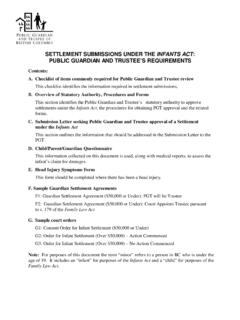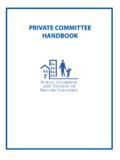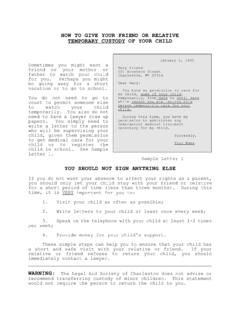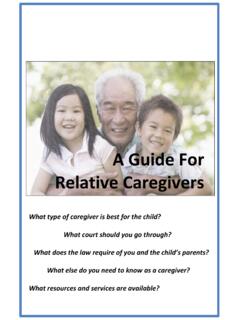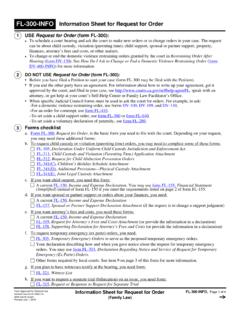Transcription of Information for Temporary Substitute Decision Makers ...
1 Why is Substitute Health Care Consent Important?In British Columbia every adult has the right to accept or refuse health care and to participate in Decision making about their own health care. An adult who is incapable still has that right, but exercising and protecting that right becomes the responsibility of a Temporary Substitute Decision maker. In BC, there are three kinds of Substitute Decision Makers for health care decisions. They are: an adult appointed by the court to be a committeeof person under the Patients Property Act; a representative under theRepresentation Agreement Act; and a Temporary Substitute Decision Maker (TSDM)chosen by a health care provider or authorized by thePublic Guardian and Trustee (PGT) under the HealthCare (Consent) and Care Facility (Admission) Act (the Act).If an adult in BC has made a legally valid Advance Directive giving or refusing consent to the treatment or health care proposed at a later date when the adult is not capable of consenting or refusing it and there is no committee of person or representative with authority to make the Decision , then a TSDM is not required and the health care provider must follow the adult s direction as set out in the Advance Directive.
2 For more Information on Advance Directives, see the Ministry of Health Information on advance care planning: GuardianshipAuthorized by the Public Guardian and TrusteeInformation for Temporary Substitute Decision Makers2 Why is the Public Guardian and Trustee Involved in Authorizing a TSDM?The Health Care (Consent) and Care Facility (Admission) Act provides that if an adult is incapable and does not have a legally appointed Substitute (either a committee of person or representative) and there is no relevant advance directive, the health care provider must choose a TSDM from a list as set out in the legislation. A TSDM may also be required if the legally appointed Substitute is not available. If, in the opinion of the health care provider, there is not an available and qualified person eligible to be a TSDM for the adult or there is a dispute about who should be chosen, then the PGT must either authorize someone to be the TSDM or act as the TSDM. The PGT will authorize someone to be a TSDM if the process will not cause undue delay in providing health care to the adult and the PGT is satisfied that the person: is able and willing to be an informed andresponsible Decision maker; and has a relationship with the adult that makesthe person an appropriate are the Responsibilities of a TSDM?
3 As a TSDM, your legal responsibility is to represent the instructions or wishes expressed by the adult when capable. If these are not known, your duty is to act in the best interests of the adult for whom you are giving or refusing informed major responsibilities are set out in detail in section 19 of the Health Care (Consent) and Care Facility (Admission) Act. As it is your duty to know and carry out these responsibilities yourself, the section is reprinted in its entirety below: 19 (1) A person chosen [as a TSDM] to give or refuse Substitute consent to health care for an adult must(a)before giving or refusing Substitute consent,consult, to the greatest extent possible,(i)with the adult, and(ii)if the person chosen [as the TSDM] is aperson authorized by the Public Guardianand Trustee, with any near relative or closefriend of the adult who asks to assist, and(b) comply with any instructions or wishes theadult expressed while he or she was capable.(2) If the adult s instructions or wishes are not known,the person chosen [as the TSDM] must decide togive or refuse consent in the adult s best interests.
4 (3) When deciding whether it is in the adult sbest interests to give, refuse or revokesubstitute consent, the person chosen[as the TSDM] must consider(a)the adult s current wishes, andknown beliefs and values,(b) whether the adult s condition orwell-being is likely to be improvedby the proposed health care,(c) whether the adult s condition or well-being is likely to improve withoutthe proposed health care,(d) whether the benefit the adult is expectedto obtain from the proposed health careis greater than the risk of harm, and(e)whether a less restrictive or less intrusiveform of health care would be as beneficialas the proposed health Records Does a TSDM Need to Keep?As a condition of authorizing you as a TSDM, the PGT requires you to keep a record of your health care decisions and to produce this record when requested by the adult, the PGT or a subsequent TSDM. your record keeping should include:3 the dates you talked to a health care providerabout the proposed health care treatment; the nature of the treatment; the decisions you have made; the names of the key health care providersinvolved as well as other people you consultedwith prior to making a Decision ; and the reasons for your Decision , , your understandingof the risks and benefits, or your understanding ofthe prior instruction or wishes of the adult, if a TSDM authorized by the PGT, the Act requires you to consult, to the greatest extent possible, with the adult and any near relative or close friend of the adult who asks to assist.
5 You must also comply with any instructions or wishes the adult expressed while they were capable. your records should include the date of your discussions and the Information you received. The PGT Notice of Authorization for you to act as a TSDM is an important record since the adult s health care providers can change. When you are called upon to act in your role as a TSDM, you should be prepared to produce this notice to the health care provider to confirm your authority. Are there restrictions on the decisions a TSDM can make?Because you are in a Decision making role, you will likely be consulted on a wide range of subjects related to the adult. While your knowledge of the adult s wishes, beliefs and values may be helpful to good Decision making among the adult s support network, your role as a TSDM is limited to making the health care decisions specified in your Notice of Authorization and by the Health Care (Consent) and Care Facility (Admission) Act and Health Care Consent Regulation (the Regulation).
6 Restricted Health Care DecisionsThe Act and Regulation specifically prohibit a TSDM from consenting to the following health care decisions: abortion unless recommended in writing bythe treating physician and at least one othermedical practitioner who has examinedthe adult for whom it is proposed; electroconvulsive therapy unless recommendedin writing by the treating physician and atleast one other medical practitioner who hasexamined the adult for whom it is proposed; psychosurgery; removal of tissue from a living human bodyfor implantation in another human body orfor medical education or research; experimental health care involving a foreseeable riskto the adult for whom the health care is proposed thatis not outweighed by the expected therapeutic benefit; participation in a health care or medical researchprogram that has not been approved by aprescribed medical research committee; or any treatment, procedure or therapy that involvesusing aversive stimuli to induce a change in to the Health Care (Consent) and Care Facility (Admission) Act and Health Care Consent Regulation are available on the BC Laws website at: health care that preserves lifeYou can only refuse consent to health care that is necessary to preserve life if there is substantial agreement among the health care providers caring for the adult that the Decision to refuse Substitute consent is medically appropriate and you have made the Decision in accordance with your responsibilities under the Act.
7 If you are uncomfortable making this Decision , you may notify the for non therapeutic reasons Note: You do not have authority to give consent to sterilization for non therapeutic reasons. Section 2 (d) of the Health Care (Consent) and Care Facility (Admission) Act states this Act does not apply to the provision of professional services, care or treatment to a person for the purposes of sterilization for non-therapeutic reasons. Major and Minor Health Care DecisionsYour Notice of Authorization will specify whether you are authorized to make major and minor health care decisions or only minor health care decisions. If you have been restricted to minor health care decisions, it is important to let the involved health care providers know that they should contact the PGT if consent for major health care is Health Care (Consent) and Care Facility (Admission) Act and the Regulation describe the difference between major and minor health care as shown in the following: Major health care means:(a)major surgery(b) any treatment involving a general anaesthetic(c) major diagnostic or investigative procedures, or(d) any health care designated byregulation as major health careThe regulation designates the following as major health care:(a)radiation therapy(b) intravenous chemotherapy(c) kidney dialysis(d) electroconvulsive therapy(e)laser surgeryMinor health care means health care that is not major health care and includes:(a)routine tests to determine ifhealth care is necessary(b) routine dental treatment that preventsor treats a condition or injury causedby disease or trauma such as.
8 (i)cavity fillings and extractions done withor without a local anesthetic; and(ii)oral hygiene inspectionsNon Health Care DecisionsIt is not unusual for a TSDM to be consulted about a range of non health care matters. The following are examples of decisions that you do not have authority to make as a TSDM under the Health Care (Consent) and Care Facility (Admission) Act: where the adult will live; whether to admit or discharge theadult from a care facility; who can visit the adult; what financial decisions need to bemade on behalf of the adult; what personal Information about the adult canbe disclosed to a third party unless disclosureis necessary to be able to consult with othersabout the proposed health care Decision ; whether to restrain the adult for a reason notrelated to a specific health care treatment; whether to sign an instruction refusing futureCardiopulmonary Resuscitation (CPR) or consentingto a Do Not Resuscitate ( DNR) order (only theadult can give instructions about future healthcare and only a doctor can make a DNR order).
9 5 NOTE: in some cases the PGT may authorize an adult to be a TSDM and/or Substitute Decision Maker (SDM) for making care facility decisions; this requires a separate authorization. See our brochure, Care Facility Admission and the Role of the Public Guardian and Trustee, for more Information on this Long Does a TSDM s Responsibility Last?The duration of your authorization will be set out in the Notice of Authorization from the PGT. A TSDM authorization can be for a single health care treatment ( , surgery), or to cover a series of health care treatments or plan of minor health care for up to one year. your responsibility ends if the person you are acting for becomes capable of making their own treatment decisions. You should advise the involved health care provider and notify the PGT if you believe the person you are acting for is capable of giving or refusing consent. In addition, if a qualified near relative or close friend becomes available or a legal Substitute Decision maker is appointed, a TSDM authorized by the PGT will no longer be chosen to make decisions.
10 A legal Substitute Decision maker, near relative or close friend does not need to be authorized by the PGT in order to begin making Substitute health care decisions on behalf of an incapable adult. What do I do if I cannot continue to act as a TSDM?If you are unable to continue to act as a TSDM for any reason, notify the involved health care provider and the PGT. A TSDM authorization is not transferable. The PGT must be notified to determine whether a new TSDM can be authorized or if the PGT will act as is the process for reauthorizing a TSDM?The process for reauthorizing a TSDM is similar to the process for the first authorization. The PGT may ask to see the record of decisions you have kept. The PGT will consider any expressed wishes made by the adult as well as the recommendations of involved health care providers or other persons with knowledge of the adult s 2019 8-19#586 Personal Decision Services700 808 West Hastings Street Vancouver, BC V6C 3L3 LOCAL PHONE604 660 4507 TOLL FREE PHONE 1 877 511 4111 LOCAL FA X604 660 9479 TOLL FREE FAX1 855 660 9479 free callingToll free calling is available through Service BC.





